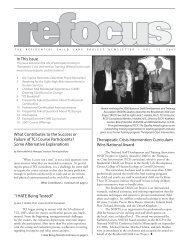The Therapeutic Crisis Intervention System - Residential Child Care ...
The Therapeutic Crisis Intervention System - Residential Child Care ...
The Therapeutic Crisis Intervention System - Residential Child Care ...
Create successful ePaper yourself
Turn your PDF publications into a flip-book with our unique Google optimized e-Paper software.
Research Foundations of TCI<br />
TCI Implementation Study<br />
Project Overview<br />
<strong>The</strong> purpose of the implementation and evaluation<br />
project involving Cornell University’s Family Life<br />
Development Center and a residential facility in<br />
the Northeastern Region of the United States was<br />
to introduce a crisis prevention and management<br />
program, <strong>The</strong>rapeutic <strong>Crisis</strong> <strong>Intervention</strong> (TCI), into<br />
a residential setting and evaluate its effect.<br />
Developed by Cornell University under a grant from<br />
the National Center on <strong>Child</strong> Abuse and Neglect<br />
in the early 1980s, TCI is a crisis prevention and<br />
intervention model for residential child care facilities<br />
that assists organizations in preventing crises from<br />
occurring, de-escalating potential crises, managing<br />
acute physical behavior, and reducing potential and<br />
actual injury to children and staff. This model gives<br />
child and youth care staff the skills, knowledge, and<br />
attitudes to help young people when they are at their<br />
most destructive. It also provides child care workers<br />
an appreciation of the influence that adults have<br />
with children who are troubled, and the sensitivity to<br />
respond to both the feelings and behavior of a youth<br />
in crisis. In all phases of this process, from prevention,<br />
to de-escalation, to therapeutic crisis management,<br />
the program is oriented toward residential child care<br />
personnel helping the child learn developmentally<br />
appropriate and constructive ways to deal with<br />
feelings of frustration, failure, anger, and pain.<br />
What Did Cornell Expect TCI To Accomplish?<br />
As a result of implementing TCI, it was anticipated<br />
that agency staff would be able to prevent, de-escalate,<br />
and manage crisis situations with children and young<br />
people in residential care. More specifically, child care<br />
workers and supervisors would:<br />
• more effectively manage and prevent crisis<br />
situations with children<br />
• feel more confident in their ability to manage crisis<br />
situations, and<br />
• work as a team to prevent, de-escalate, and manage<br />
acute crises<br />
Research Foundations of TCI<br />
As a result of the implementation of TCI, the facility<br />
would see:<br />
• fewer physical restraint episodes after<br />
implementation and training<br />
• fewer injuries to children and staff as a result of<br />
physical restraints<br />
• increased knowledge and skill on the part of facility<br />
personnel to handle crisis episodes effectively, and<br />
• an attitude change among staff and supervisors on<br />
the use of physical action in crisis situations<br />
It was recognized that, immediately after TCI<br />
training and implementation, the facility might see<br />
an increase in the numbers of incident reports due to<br />
better reporting, documentation, and monitoring of<br />
incidents.<br />
What Was Cornell’s Implementation and<br />
Evaluation Plan?<br />
<strong>The</strong> implementation and evaluation project was<br />
designed to be completed in three phases over 18<br />
months, from October 1994 to March 31, 1996 (See<br />
Figure 3 on page 8).<br />
<strong>The</strong> pre-implementation phase: During the<br />
first phase of this project (October, 1994 to March,<br />
1995) prior to implementation of TCI, Cornell<br />
staff collected incident reports, and developed a<br />
computer-based data collection instrument to<br />
facilitate analysis and record incidents.<br />
<strong>The</strong> training and implementation phase:<br />
During the second phase of this project (March<br />
1995 to September 1995), Cornell staff met with the<br />
residential care staff to administer pre-tests, conduct<br />
interviews (all tests and interviews were confidential<br />
and anonymous). Four trainers from the organization<br />
attended Training of Trainers in <strong>The</strong>rapeutic <strong>Crisis</strong><br />
<strong>Intervention</strong> workshops sponsored by the <strong>Residential</strong><br />
<strong>Child</strong> <strong>Care</strong> Project. Throughout the training and<br />
implementation phase all levels of residential child<br />
care personnel attended TCI training conducted by<br />
the Cornell-trained residential staff. In addition,<br />
supervisors attended special sessions conducted by<br />
Cornell staff to consider implementation, monitoring,<br />
and supervisory issues.<br />
THERAPEUTIC CRISIS INTERVENTION SYSTEM: <strong>Residential</strong> <strong>Child</strong> <strong>Care</strong> Project, Cornell University 7



